MNS COUNCIL AND BYLAWS
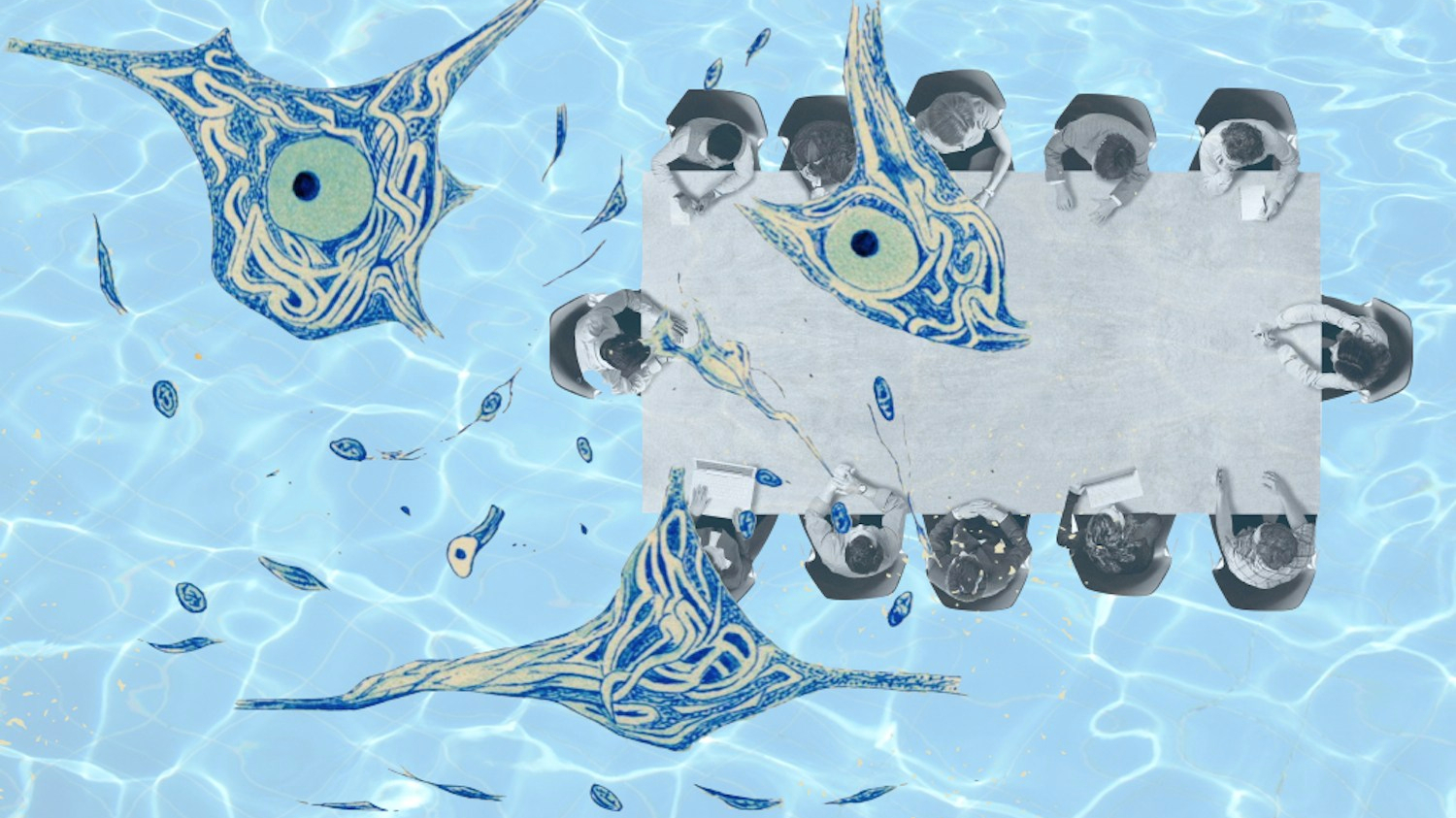
The MNS is coordinated by a board of
15 council members among which an
executive committee is selected, including a president, a general secretary, a treasurer (and their vice-persons). According to the MNS bylaws, new councilors are elected by the general assembly held during the last Mediterranean Neuroscience Conference and remain in charge for maximum two consecutive terms of 2 years each (with a council thus fully renovated every two MNS conferences). _
MNS Bylaws
MNS Rulebook
Previous MNS Councils and Executive Committees
The current MNS Council and executive committee (2023-2025) are composed by:
PRESIDENT
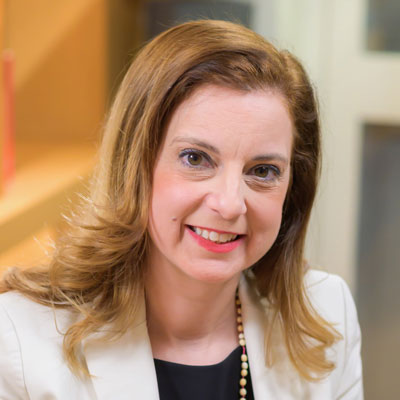 Prof. Christina Dalla
Prof. Christina Dalla is Professor of Pharmacology at the Medical School, National and Kapodistrian University of Athens, President of the Mediterranean Neuroscience Society and President of the Hellenic Brain Council. She is also member of the board of directors of the European Brain Foundation in Brussels, member of the Communication Committee of the Federation of European neuroscience Societies/FENS, section-editor at European Journal of Neuroscience and member of the Educational and Scientific Committees of the European College of Neuropsychopharmacology-ECNP. Her work focuses on sex differences in neuropsychiatric disorders and novel treatments with a focus on depression and anxiety. Dr. Dalla received her first diploma from the Pharmacy School of the National and Kapodistrian University of Athens in 2000 and continued her studies in Neuropsychopharmacology, Behavioral Neuroendocrinology and Neurosciences in Athens, at the University of Liege in Belgium and at the Rutgers University of New Jersey, U.S.A. with two European Union Marie Curie Fellowships. She has received numerous awards and distinctions, such as the “L’Oreal-Unesco” for Greek Women in Science and the ECNP fellowship award. Dr. Dalla has more than 100 scientific papers and invited chapters, over 5600 citations and more than 130 abstracts and talks at international and national conferences. She serves at committees, such as the Gender Equality Committee of her University, as well as at the National Medicines Association of Greece (EOF). Also, she is actively participating in public activities for brain awareness and neuroscience matters, such as publishing of books for the public.
http://psychopharmacology.med.uoa.gr
https://onlinelibrary.wiley.com/doi/full/10.1002/jnr.24602
PAST PRESIDENT
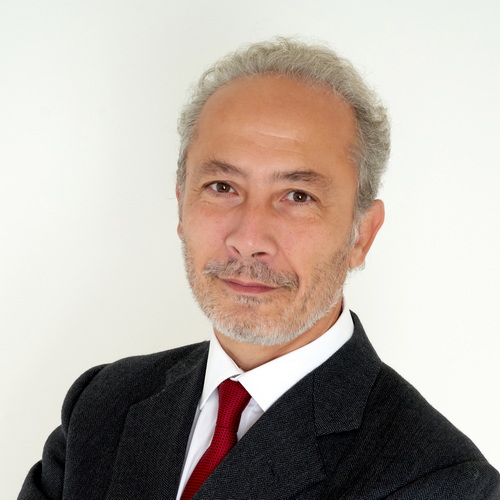 Giuseppe Di Giovanni (2019 - 2023)
Giuseppe Di Giovanni (2019 - 2023)
Giuseppe Di Giovanni, Cavaliere (born May 24, 1968; Palermo, Italy) is a Professor of Human Physiology and Neuroscience at the University of Malta.
Di Giovanni Giuseppe received his PhD in Neuroscience from the University of Chieti, Italy and was a postdoctoral fellow at Yale University, CT, USA.
He served as a Senior Lecturer of Human Physiology at the Faculty of Medicine and Surgery, University of Palermo. Later he became a Professor of Human Physiology and Neuroscience at the University of Malta, as well as an Honorary Professor at the Neuroscience Division of the School of Biosciences at Cardiff University, UK. His main research interests are in experimental neurology and biological psychiatry. Specifically, he is interested in the pathophysiological role of cannabinoids and serotonin, and especially of the 5-HT2C receptors, in brain disorders, such as epilepsy, depression, drugs of abuse and Parkinson's disease. He has published more than 150 articles in top biomedical journals including Nature Medicine and Nature Neuroscience, 15 books and several journal special issues. He is the Past President of the Mediterranean Neuroscience Society (MNS), the President of the Malta Physiological Society and the Treasurer of the Malta Neuroscience Network. He is the Editor-in-Chief of the prestigious Journal of Neuroscience Methods by Elsevier, Amsterdam, Netherlands and the Editor of the book series "The Receptors" by Springer, USA. He serves as associate editor for the CNS Neuroscience & Therapeutics by Wiley. On 28 May 2020 he was awarded the honour of Cavaliere (Knight) of the Order of the Star of Italy by the President of the Italian Republic Sergio Mattarella. He was listed among the World’s Top 2% of Scientists ranking for his work in 2019 and 2020 in Neuroscience. In 2022, he was elected a member of Academia Europaea, due to his achievements in Physiology and Neuroscience research and Secretary-General of IBRO, the International Brain Research Organization, for the term January 2023 – December 2025.
VICE-PRESIDENT AND PRESIDENT ELECT
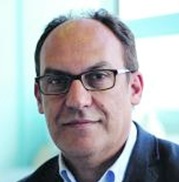 Dr. Youssef Anouar
Dr. Youssef Anouar
Dr Youssef Anouar is President of the French Society of Neuroendocrinology and Vice-President and President-elect of the Mediterranean Neuroscience Society. He is affiliated with the Research Director at INSERM, the French institute of biomedical research, and Chief, Section on Neuroendocrine Plasticity and Pathophysiology, INSERM U1239, University of Rouen Normandie. He has much experience in service to scientific community with Editorial Board service at Antioxidant and Redox Signaling, J Mol Neuroscience, Frontiers of Physiology, Frontiers of Endocrinology/Neuroendocrine section; Frontiers of Chemistry;
As a neuroscientist from the South-Mediterranean area, and working in a European country for many years after few years spent in USA, he came to meet many scientists interested in the wonderful world of Neuroscience. He organized or participated to the organization of several meetings (the French Society of Neuroendocrinology meeting, The International Chromaffin Cell Biology meeting, The International Conference on Neuroendocrinology, RegPep, Mediterranean Neuroscience Conference, etc), with the aim to make scientists from different geographic areas, including less-favored countries, work together and contribute to the major findings made in Neuroscience.
GENERAL SECRETARY
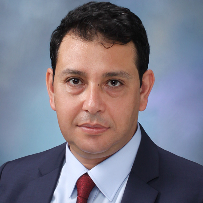 Khalid EL ALLALI
Khalid EL ALLALI is an Associate Professor at the Hassan II Institute of Agronomy and Veterinary Medicine (IAV Hassan II), Rabat, Morocco. He graduated from the same institution, in 1999 with a Doctorate in Veterinary Medicine. He started working as an Assistant professor in Comparative Anatomy Unit of IAV Hassan II, teaching veterinary anatomy of domestic mammals and conducting first research in the field of camel anatomy. He then earned in 2005 a Diploma of Specialized High Studies: DESS on Immunology and genetic (MS equivalent) from Mohamed V University of Rabat. In 2009, he graduated a Doctorate of University in Neuroscience from Strasbourg University and a National Doctorate from AbdelmalkEssaâdy University of Tétouan: PhD prepared as cotutelle program. In 2010, he formed a new research group with new research area labeled by the CNRST as IAV-URAC-49. The area of research on which this new team works is the Biological rhythms and adaptation strategies of camel and goats to the desert harsh environment with a special focus on circadian rhythms and on reproduction as a seasonal rhythm. In 2013, Khalid El Allali presented a public defense and earned an HDR diploma (Habilitation to Conduct Research) and since worked as an Associate Professor and head of Comparative Unit-URAC49 at the some institution. He was a member of the administrative council of the Franco-Moroccan network in Neurosciences: ‘GDRI France Morocco’ 2010-2015 and from 2011-2014 a member of executive committee of The Center Competence in Neurosciences: “Neuropôle”. He is an active member of many Scientific Societies, a member of the Council of the Mediterranean Neuroscience Society (MNS) and a member of the Executive Committee of SONA (Society for African Neuroscientists) and of SFC (Francophone Society of Chronobiology). He served since 2014 as a consultant of IAV Hassan II to many National institutions especially in the field of camel breeding. He is the author of many scientific papers, chapters of books. His main current research projects are: 1-the ambient temperature as the forgotten zeitgeber and 2- the control of the breeding season in the camel".
VICE-SECRETARY
 Luisa Pinto
Luisa Pinto
Luisa Pinto (PhD) has graduated in Biochemistry by the University of Coimbra and performed an internship at the Karolinska Institute (Sweden) on therapeutic tools for Parkinson’s Disease. She obtained a PhD in Neurosciences by the Ludwig-Maximilians-Universität München (Germany) in 2008, under the supervision of Dr. Magdalena Goetz, and did then post-doctoral research in the lab of Prof. Nuno Sousa, at the Life and Health Sciences Research Institute (ICVS), University of Minho (Portugal). She is currently an Assistant Researcher with tenure and team coordinator of the “Brain circuits and neuron-glia adaptations” thematic line at ICVS, focusing on novel therapeutics for Depression and Neurodegenerative Disorders. She is also an Invited Assistant Professor at the School of Medicine, University of Minho, and member of the Direction of ICVS as elected representative of the team coordinators of the Institute. Luisa Pinto is CEO of a start-up company “BNML – Behavioural & Molecular Lab” and co-founder Member of the European College of NeuroPsychopharmacolgy (ECNP) Thematic Network on Resilience. Research skills cover stem cell biology; assessment of neuroplastic events; behavioral tests; electrophysiological techniques; stem cell cultures and pre-clinical animal models. She authored and co-authored over 70 scientific publications, cited above 2500 times.
TREASURER
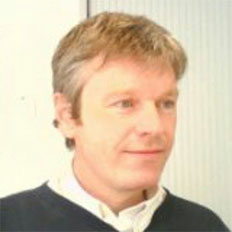 Professor Jacques Noël
Professor Jacques Noël started his scientific carrier with a PhD at the University Paris 11 Orsay where he studied intracellular calcium oscillations in hepatocytes. Then he did a post-doc at the MRC Center for Synaptic plasticity at the University of Bristol, where he worked on GluA2 receptor recycling in the postsynaptic membrane and GLuA2 interaction with NSF in hippocampal neurons. He is now Professor of neuroscience at the Université Côte d'Azur, in Nice on the French Riviera. He leads projects on pain research. He deciphers the role of some of the ion channels involved in the detection of noxious stimuli by the sensory nerve terminals in the skin and muscle. His special interest is on background potassium channels K2p and Acid Sensing Ion Channels (ASICs) that are gated by mechanical, thermal or chemical stimuli. These transmembrane proteins are expressed in sensory neurons where they control the transduction of physical and chemical stimuli into electrical activity to trigger action potentials that travel along the nerve fibres to conduce sensory information to the central nervous system for pain sensation.
ALL COUNCILORS
 Eleonora Palma
Eleonora Palma is full Professor of Physiology at the Faculty of Pharmacy and Medicine, Sapienza University of Rome, Italy. She received her PhD in Biophysics from Sapienza University of Rome and she was a postdoctoral fellow and assistant researcher at Hôpital Cantonal de Genève, University of Geneva (Switzerland), Department of Physiology. She was also a research fellow of Grass Foundation (Woods Hole, Boston, USA) and a Telethon Foundation Fellow for three years. Prof. Palma had a long-lasting collaboration with Irvine University (CA, USA) where she has been several times as visiting Professor. More recently, she is collaborating with Amsterdam University, Netherlands and with Istituto M. Negri in Italy especially on the study of the role of neuroinflammation in human and experimental epilepsies. Indeed, her research is mostly focused on the GABAergic and glutamatergic dysfunction in human drug-resistant epilepsies using different electrophysiological and molecular approaches. In 2014, one of her paper, Roseti et al., has been awarded with the prestigious Morris-Coole Award (ILAE). Recently, she also focused her interest on the alteration of synaptic mechanisms in human epilepsies particularly with regard to rare pediatric diseases. Thanks to the collaboration with clinicians, she started also to work on the involvement of nicotinic receptors in the amyotrophic lateral sclerosis (ALS) disease progression investigating the role of the muscle in ALS neurodegeneration.
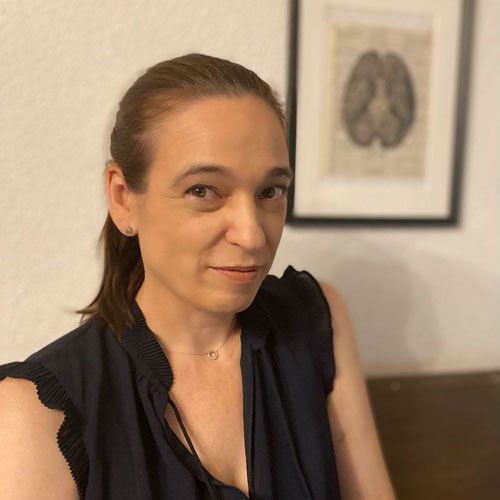 Eva de Lago Femia
Eva de Lago Femia is Associate Professor, Faculty of Medicine at Complutense University of Madrid where she is also Director of the Neurochemistry University Institute of UCM. She is interested in the study of the changes that occur in elements of the endocannabinoid system in several neurodegenerative diseases, mainly in amyotrophic lateral sclerosis and frontotemporal dementia, using both experimental models (cellular or in vivo) and patients’ samples. Her aim is to identify targets of this system that could be used for neuroprotective treatments and to study the molecular and/or cellular mechanisms through which they could exert this type of effect. She is member of the Spanish society for research on cannabinoids (SEIC) and the Center for Biomedical Research in Neurodegenerative Diseases Network (CIBERNED). She is also involved in outreach activities, e.g., creating an open course about neurodegenerative disorders and disseminating research to the public using social media.
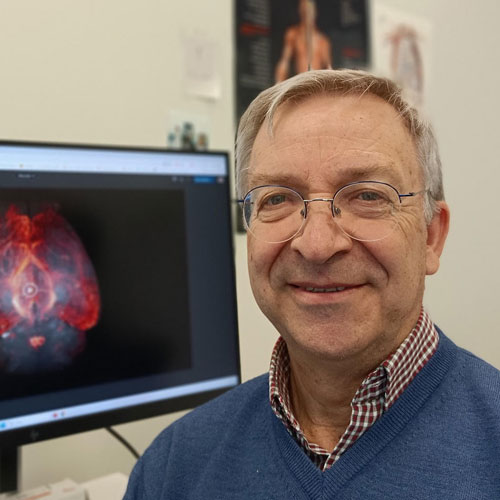 Francisco Eliseo Olucha Bordonau
Francisco Eliseo Olucha Bordonau is Full Professor in Human Anatomy and Embryology at the Universitat Jaume I (UJI) in Castellón SPAIN. Along my scientific carrier I have participated in many articles focused on neuroanatomy, first in comparative neuroanatomy and finally in functional neuroanatomy combining classical tracing and cytoarchitectonic with biochemical, electrophysiological and biotechnological approaches. The present focus is the brainstem control of cognition and emotion centered on the role of the nucleus incertus and the neuropeptides like relaxin3 in modulating emotional and affective behavior, specially contextual fear conditioning and social recognition. We have participated in regional, national and European projects and now a new focus is added on the impact of pollution on neural function. Now I am directing the Doctorate Program on Biomedical Sciences at UJI.
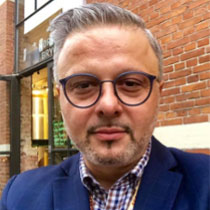 Dr. Ioannis Sotiropoulos
Dr. Ioannis Sotiropoulos is a Researcher C - Group leader at the Institute of Biosciences & Applications, NCSR "Demokritos", Greece. His research work focuses on understanding the orchestrating role of environmental risk factors (e.g., chronic, lifetime stress) on the onset of Alzheimer´s disease (AD) with a specific focus on the relationship between AD and depression, a stress-related disorder. Combining cell-, animal- and human-based studies, Dr. Sotiropoulos' innovative work aims to clarify the diverse factors that regulate the cellular role of Tau as a key molecule of neuroplasticity and neuropathology while his recent work focuses on exosomes as both mediators of brain pathology and potent biomarkers. He has previously trained and worked at the Max Planck Institute of Psychiatry (Germany), Columbia University (USA), RIKEN-Brain Science Institute (Japan), University College London (UCL) & MRC Center for Synaptic Plasticity (UK), and Medical School of University of Minho (Portugal). He has received different prizes & awards e.g., Hirnliga Alzheimer Award 2009, AD/PD Young Faculty 2014 Award, Jerome Lejeune 2017 Award, Janssen Innovation Award 2017, Alzheimer Association Award for Best Mentor in Neuroscience 2021. He is an active member of the Hellenic Initiative Against Alzheimer’s Disease (HIAAD.gr), a network of basic and clinical scientists promoting translational and clinical research as well as Alzheimer’s disease daycare centers in Greece.
 Dr. Lucy Privitera
Dr. Lucy Privitera is a Lecturer (Assistant Professor) at Queen Mary University of London, Malta Campus and Honorary Lecturer at Queen Mary University of London. Dr. Privitera is neurobiologist of learning and memory. Her research combines neuroscience, biology and pharmacology to address specific issues of the molecular mechanisms underlying learning and memory in both healthy conditions and in neurodegenerative diseases, especially Alzheimer’s Disease. Dr Privitera scientific expertise is ex-vivo and in-vivo electrophysiology, behavioural study, optogenetics and biochemistry (IHC, WB). Dr Privitera serves in Editorial Boards at Frontiers in Molecular Medicine - Molecular Mechanisms of Neurodegeneration, and at Journal Neuroscience Methods Elsevier.
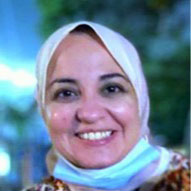 Nermeen Zakaria Abuelezz
Nermeen Zakaria Abuelezz is an Associate Professor of Clinical Biochemistry and Molecular Biology at faculty of Pharmacy, MUST University , Egypt. Earned master’s and PhD degrees in Pharmaceutical Sciences, Faculty of Pharmacy, Cairo University. Her research focus is into exploring molecular disruptions implicated in inflammatory and neurodegenerative disorders and Investigating potential early diagnostic biomarkers for neurodegenerative disorders as Alzheimer’s. She also works with her team on Integration of biocompatible nano-formulations for enhancing therapeutic and biomedical applications of biomolecules. In 2019, She was awarded an STDF grant as a principal investigator for youth research project to investigate microRNAs as potential diagnostic markers for Alzheimer’s in the Egyptian population. In 2023, she was awarded a visiting fellowship for training and research by Mujeres Por Africa Foundation to investigate molecular alterations in Alzheimer’s disease, as a visiting fellow at the institute of neurosciences, Miguel Hernandez University, Alicante, Spain. She is also the winner of the second edition of Women in Science contest “From labs to Society Proposal” for creation of a platform to raise awareness about dementia and promote support for dementia affected families in Egypt.
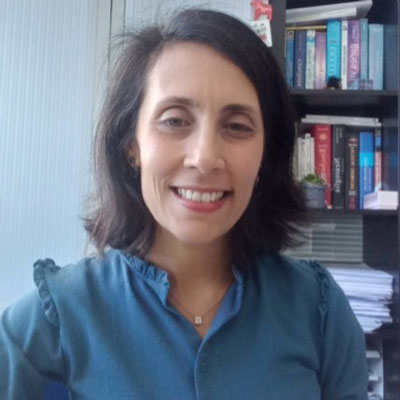 Sandra Vaz
Sandra Vaz did her Phd at the Universidade de Lisboa and the University of Copenhagen, studying the modulation of GABA transporter in astrocytes by BDNF, them she move for a postdoc at Instituto de Medicina Molecular João Lobo Antunes to study the role of astrocytes on synaptic plasticity and she is now an Associate Professor at the FMUL and a Researcher at iMM, in Lisbon. She has a solid reputation in the field of astrocytes, with her research focused on the tripartite synapse, particularly the regulation of synaptic activity by astrocytes. As a result, she has developed broad expertise in the field of astrocyte-neuron communication, becoming an expert in GABA transporters, BDNF/TrkB signaling, and modulation of the adenosinergic system in both astrocytes and neurons. Currently, she is interested in studying the astrocytic mechanisms implicated in Childhood Absence Epilepsy, ALS, and Alzheimer’s disease, particularly involving neurotransmitter transporters, adenosine receptors, and the endocannabinoid CB1 receptor. Many of her projects have been motivated by her interest in cellular Ca2+ signaling, as well as her knowledge of patch-clamp, field-excitatory postsynaptic, and microelectrode array (MEA) system recordings as proven by her publication track record. Ehe has been supervising several Ph.D. and MSc students, and along with her scientific management, Sandra has been involved in the management of scientific society, being part of the board of the Portuguese Glial Network (rede glial portuguesa) and the Portuguese Society of Farmacology, and Council in the Mediterranean Neuroscience Society. In 2021, she was awarded the International Society for Neurochemistry Career Development Grant.
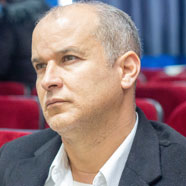 Taoufik Ghrairi
Taoufik Ghrairi is Full Professor in the Department of Biology at the Faculty of Sciences of Tunis, Tunis El Manar University, Tunis, Tunisia. His research interests lie in the area of Actives Biomolecules ranging from Neuroprotection to antimicrobials activities. Taoufik has served on roughly twenty conference and workshop program committees and served as the Program Chair for BMAT2020 and MNS2023 confrences. He currently serves on the Editorial Board of the Journal Annals of Microbiology. He received his Ph.D. in Biochemistry from Tunis El Manar University and University of Poitiers in 2004.
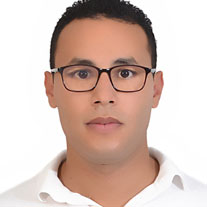 Zakaria Ouhaz
Zakaria Ouhaz is an Assistant Professor of physiology at “Institut Supérieur des Professions Infirmière et techniques de la santé” of Marrakech, Morocco. He received his doctorate in Neuroscience from Cadi Ayyad University, Morocco, and completed his postdoctoral training in the Lab of Professor Anna Mitchell at the University of Oxford. A Royal Society Newton International Fellowship is currently supporting Pr Ouhaz's research. Pr Ouhaz’s research aims to understand the functional importance and underlying mechanisms associated with cortical-thalamocortical interactions in some of our daily cognitive abilities, e.g., learning new information, memory recall, and adaptive decision-making. He uses a combination of research techniques, including behavioural and cognitive neuroscience testing, rodent electrophysiology, lesion studies and pharmacogenetics, brain imaging, and neuroanatomical tracing studies. He is currently investigating how, and in what ways the interactions between the mediodorsal thalamus and interconnected neural regions (especially cortex) contribute to cognitive functioning using rodents. Dr Ouhaz also studies cognitive abilities in following damage in the dorsal thalamus, e.g., after stroke or schizophrenia.
 The MNS is coordinated by a board of 15 council members among which an executive committee is selected, including a president, a general secretary, a treasurer (and their vice-persons). According to the MNS bylaws, new councilors are elected by the general assembly held during the last Mediterranean Neuroscience Conference and remain in charge for maximum two consecutive terms of 2 years each (with a council thus fully renovated every two MNS conferences). _
The MNS is coordinated by a board of 15 council members among which an executive committee is selected, including a president, a general secretary, a treasurer (and their vice-persons). According to the MNS bylaws, new councilors are elected by the general assembly held during the last Mediterranean Neuroscience Conference and remain in charge for maximum two consecutive terms of 2 years each (with a council thus fully renovated every two MNS conferences). _  Prof. Christina Dalla is Professor of Pharmacology at the Medical School, National and Kapodistrian University of Athens, President of the Mediterranean Neuroscience Society and President of the Hellenic Brain Council. She is also member of the board of directors of the European Brain Foundation in Brussels, member of the Communication Committee of the Federation of European neuroscience Societies/FENS, section-editor at European Journal of Neuroscience and member of the Educational and Scientific Committees of the European College of Neuropsychopharmacology-ECNP. Her work focuses on sex differences in neuropsychiatric disorders and novel treatments with a focus on depression and anxiety. Dr. Dalla received her first diploma from the Pharmacy School of the National and Kapodistrian University of Athens in 2000 and continued her studies in Neuropsychopharmacology, Behavioral Neuroendocrinology and Neurosciences in Athens, at the University of Liege in Belgium and at the Rutgers University of New Jersey, U.S.A. with two European Union Marie Curie Fellowships. She has received numerous awards and distinctions, such as the “L’Oreal-Unesco” for Greek Women in Science and the ECNP fellowship award. Dr. Dalla has more than 100 scientific papers and invited chapters, over 5600 citations and more than 130 abstracts and talks at international and national conferences. She serves at committees, such as the Gender Equality Committee of her University, as well as at the National Medicines Association of Greece (EOF). Also, she is actively participating in public activities for brain awareness and neuroscience matters, such as publishing of books for the public.
Prof. Christina Dalla is Professor of Pharmacology at the Medical School, National and Kapodistrian University of Athens, President of the Mediterranean Neuroscience Society and President of the Hellenic Brain Council. She is also member of the board of directors of the European Brain Foundation in Brussels, member of the Communication Committee of the Federation of European neuroscience Societies/FENS, section-editor at European Journal of Neuroscience and member of the Educational and Scientific Committees of the European College of Neuropsychopharmacology-ECNP. Her work focuses on sex differences in neuropsychiatric disorders and novel treatments with a focus on depression and anxiety. Dr. Dalla received her first diploma from the Pharmacy School of the National and Kapodistrian University of Athens in 2000 and continued her studies in Neuropsychopharmacology, Behavioral Neuroendocrinology and Neurosciences in Athens, at the University of Liege in Belgium and at the Rutgers University of New Jersey, U.S.A. with two European Union Marie Curie Fellowships. She has received numerous awards and distinctions, such as the “L’Oreal-Unesco” for Greek Women in Science and the ECNP fellowship award. Dr. Dalla has more than 100 scientific papers and invited chapters, over 5600 citations and more than 130 abstracts and talks at international and national conferences. She serves at committees, such as the Gender Equality Committee of her University, as well as at the National Medicines Association of Greece (EOF). Also, she is actively participating in public activities for brain awareness and neuroscience matters, such as publishing of books for the public. Giuseppe Di Giovanni (2019 - 2023)
Giuseppe Di Giovanni (2019 - 2023) Dr. Youssef Anouar
Dr. Youssef Anouar Khalid EL ALLALI is an Associate Professor at the Hassan II Institute of Agronomy and Veterinary Medicine (IAV Hassan II), Rabat, Morocco. He graduated from the same institution, in 1999 with a Doctorate in Veterinary Medicine. He started working as an Assistant professor in Comparative Anatomy Unit of IAV Hassan II, teaching veterinary anatomy of domestic mammals and conducting first research in the field of camel anatomy. He then earned in 2005 a Diploma of Specialized High Studies: DESS on Immunology and genetic (MS equivalent) from Mohamed V University of Rabat. In 2009, he graduated a Doctorate of University in Neuroscience from Strasbourg University and a National Doctorate from AbdelmalkEssaâdy University of Tétouan: PhD prepared as cotutelle program. In 2010, he formed a new research group with new research area labeled by the CNRST as IAV-URAC-49. The area of research on which this new team works is the Biological rhythms and adaptation strategies of camel and goats to the desert harsh environment with a special focus on circadian rhythms and on reproduction as a seasonal rhythm. In 2013, Khalid El Allali presented a public defense and earned an HDR diploma (Habilitation to Conduct Research) and since worked as an Associate Professor and head of Comparative Unit-URAC49 at the some institution. He was a member of the administrative council of the Franco-Moroccan network in Neurosciences: ‘GDRI France Morocco’ 2010-2015 and from 2011-2014 a member of executive committee of The Center Competence in Neurosciences: “Neuropôle”. He is an active member of many Scientific Societies, a member of the Council of the Mediterranean Neuroscience Society (MNS) and a member of the Executive Committee of SONA (Society for African Neuroscientists) and of SFC (Francophone Society of Chronobiology). He served since 2014 as a consultant of IAV Hassan II to many National institutions especially in the field of camel breeding. He is the author of many scientific papers, chapters of books. His main current research projects are: 1-the ambient temperature as the forgotten zeitgeber and 2- the control of the breeding season in the camel".
Khalid EL ALLALI is an Associate Professor at the Hassan II Institute of Agronomy and Veterinary Medicine (IAV Hassan II), Rabat, Morocco. He graduated from the same institution, in 1999 with a Doctorate in Veterinary Medicine. He started working as an Assistant professor in Comparative Anatomy Unit of IAV Hassan II, teaching veterinary anatomy of domestic mammals and conducting first research in the field of camel anatomy. He then earned in 2005 a Diploma of Specialized High Studies: DESS on Immunology and genetic (MS equivalent) from Mohamed V University of Rabat. In 2009, he graduated a Doctorate of University in Neuroscience from Strasbourg University and a National Doctorate from AbdelmalkEssaâdy University of Tétouan: PhD prepared as cotutelle program. In 2010, he formed a new research group with new research area labeled by the CNRST as IAV-URAC-49. The area of research on which this new team works is the Biological rhythms and adaptation strategies of camel and goats to the desert harsh environment with a special focus on circadian rhythms and on reproduction as a seasonal rhythm. In 2013, Khalid El Allali presented a public defense and earned an HDR diploma (Habilitation to Conduct Research) and since worked as an Associate Professor and head of Comparative Unit-URAC49 at the some institution. He was a member of the administrative council of the Franco-Moroccan network in Neurosciences: ‘GDRI France Morocco’ 2010-2015 and from 2011-2014 a member of executive committee of The Center Competence in Neurosciences: “Neuropôle”. He is an active member of many Scientific Societies, a member of the Council of the Mediterranean Neuroscience Society (MNS) and a member of the Executive Committee of SONA (Society for African Neuroscientists) and of SFC (Francophone Society of Chronobiology). He served since 2014 as a consultant of IAV Hassan II to many National institutions especially in the field of camel breeding. He is the author of many scientific papers, chapters of books. His main current research projects are: 1-the ambient temperature as the forgotten zeitgeber and 2- the control of the breeding season in the camel". Luisa Pinto
Luisa Pinto Professor Jacques Noël started his scientific carrier with a PhD at the University Paris 11 Orsay where he studied intracellular calcium oscillations in hepatocytes. Then he did a post-doc at the MRC Center for Synaptic plasticity at the University of Bristol, where he worked on GluA2 receptor recycling in the postsynaptic membrane and GLuA2 interaction with NSF in hippocampal neurons. He is now Professor of neuroscience at the Université Côte d'Azur, in Nice on the French Riviera. He leads projects on pain research. He deciphers the role of some of the ion channels involved in the detection of noxious stimuli by the sensory nerve terminals in the skin and muscle. His special interest is on background potassium channels K2p and Acid Sensing Ion Channels (ASICs) that are gated by mechanical, thermal or chemical stimuli. These transmembrane proteins are expressed in sensory neurons where they control the transduction of physical and chemical stimuli into electrical activity to trigger action potentials that travel along the nerve fibres to conduce sensory information to the central nervous system for pain sensation.
Professor Jacques Noël started his scientific carrier with a PhD at the University Paris 11 Orsay where he studied intracellular calcium oscillations in hepatocytes. Then he did a post-doc at the MRC Center for Synaptic plasticity at the University of Bristol, where he worked on GluA2 receptor recycling in the postsynaptic membrane and GLuA2 interaction with NSF in hippocampal neurons. He is now Professor of neuroscience at the Université Côte d'Azur, in Nice on the French Riviera. He leads projects on pain research. He deciphers the role of some of the ion channels involved in the detection of noxious stimuli by the sensory nerve terminals in the skin and muscle. His special interest is on background potassium channels K2p and Acid Sensing Ion Channels (ASICs) that are gated by mechanical, thermal or chemical stimuli. These transmembrane proteins are expressed in sensory neurons where they control the transduction of physical and chemical stimuli into electrical activity to trigger action potentials that travel along the nerve fibres to conduce sensory information to the central nervous system for pain sensation.
 Eleonora Palma is full Professor of Physiology at the Faculty of Pharmacy and Medicine, Sapienza University of Rome, Italy. She received her PhD in Biophysics from Sapienza University of Rome and she was a postdoctoral fellow and assistant researcher at Hôpital Cantonal de Genève, University of Geneva (Switzerland), Department of Physiology. She was also a research fellow of Grass Foundation (Woods Hole, Boston, USA) and a Telethon Foundation Fellow for three years. Prof. Palma had a long-lasting collaboration with Irvine University (CA, USA) where she has been several times as visiting Professor. More recently, she is collaborating with Amsterdam University, Netherlands and with Istituto M. Negri in Italy especially on the study of the role of neuroinflammation in human and experimental epilepsies. Indeed, her research is mostly focused on the GABAergic and glutamatergic dysfunction in human drug-resistant epilepsies using different electrophysiological and molecular approaches. In 2014, one of her paper, Roseti et al., has been awarded with the prestigious Morris-Coole Award (ILAE). Recently, she also focused her interest on the alteration of synaptic mechanisms in human epilepsies particularly with regard to rare pediatric diseases. Thanks to the collaboration with clinicians, she started also to work on the involvement of nicotinic receptors in the amyotrophic lateral sclerosis (ALS) disease progression investigating the role of the muscle in ALS neurodegeneration.
Eleonora Palma is full Professor of Physiology at the Faculty of Pharmacy and Medicine, Sapienza University of Rome, Italy. She received her PhD in Biophysics from Sapienza University of Rome and she was a postdoctoral fellow and assistant researcher at Hôpital Cantonal de Genève, University of Geneva (Switzerland), Department of Physiology. She was also a research fellow of Grass Foundation (Woods Hole, Boston, USA) and a Telethon Foundation Fellow for three years. Prof. Palma had a long-lasting collaboration with Irvine University (CA, USA) where she has been several times as visiting Professor. More recently, she is collaborating with Amsterdam University, Netherlands and with Istituto M. Negri in Italy especially on the study of the role of neuroinflammation in human and experimental epilepsies. Indeed, her research is mostly focused on the GABAergic and glutamatergic dysfunction in human drug-resistant epilepsies using different electrophysiological and molecular approaches. In 2014, one of her paper, Roseti et al., has been awarded with the prestigious Morris-Coole Award (ILAE). Recently, she also focused her interest on the alteration of synaptic mechanisms in human epilepsies particularly with regard to rare pediatric diseases. Thanks to the collaboration with clinicians, she started also to work on the involvement of nicotinic receptors in the amyotrophic lateral sclerosis (ALS) disease progression investigating the role of the muscle in ALS neurodegeneration.
 Eva de Lago Femia is Associate Professor, Faculty of Medicine at Complutense University of Madrid where she is also Director of the Neurochemistry University Institute of UCM. She is interested in the study of the changes that occur in elements of the endocannabinoid system in several neurodegenerative diseases, mainly in amyotrophic lateral sclerosis and frontotemporal dementia, using both experimental models (cellular or in vivo) and patients’ samples. Her aim is to identify targets of this system that could be used for neuroprotective treatments and to study the molecular and/or cellular mechanisms through which they could exert this type of effect. She is member of the Spanish society for research on cannabinoids (SEIC) and the Center for Biomedical Research in Neurodegenerative Diseases Network (CIBERNED). She is also involved in outreach activities, e.g., creating an open course about neurodegenerative disorders and disseminating research to the public using social media.
Eva de Lago Femia is Associate Professor, Faculty of Medicine at Complutense University of Madrid where she is also Director of the Neurochemistry University Institute of UCM. She is interested in the study of the changes that occur in elements of the endocannabinoid system in several neurodegenerative diseases, mainly in amyotrophic lateral sclerosis and frontotemporal dementia, using both experimental models (cellular or in vivo) and patients’ samples. Her aim is to identify targets of this system that could be used for neuroprotective treatments and to study the molecular and/or cellular mechanisms through which they could exert this type of effect. She is member of the Spanish society for research on cannabinoids (SEIC) and the Center for Biomedical Research in Neurodegenerative Diseases Network (CIBERNED). She is also involved in outreach activities, e.g., creating an open course about neurodegenerative disorders and disseminating research to the public using social media.
 Francisco Eliseo Olucha Bordonau is Full Professor in Human Anatomy and Embryology at the Universitat Jaume I (UJI) in Castellón SPAIN. Along my scientific carrier I have participated in many articles focused on neuroanatomy, first in comparative neuroanatomy and finally in functional neuroanatomy combining classical tracing and cytoarchitectonic with biochemical, electrophysiological and biotechnological approaches. The present focus is the brainstem control of cognition and emotion centered on the role of the nucleus incertus and the neuropeptides like relaxin3 in modulating emotional and affective behavior, specially contextual fear conditioning and social recognition. We have participated in regional, national and European projects and now a new focus is added on the impact of pollution on neural function. Now I am directing the Doctorate Program on Biomedical Sciences at UJI.
Francisco Eliseo Olucha Bordonau is Full Professor in Human Anatomy and Embryology at the Universitat Jaume I (UJI) in Castellón SPAIN. Along my scientific carrier I have participated in many articles focused on neuroanatomy, first in comparative neuroanatomy and finally in functional neuroanatomy combining classical tracing and cytoarchitectonic with biochemical, electrophysiological and biotechnological approaches. The present focus is the brainstem control of cognition and emotion centered on the role of the nucleus incertus and the neuropeptides like relaxin3 in modulating emotional and affective behavior, specially contextual fear conditioning and social recognition. We have participated in regional, national and European projects and now a new focus is added on the impact of pollution on neural function. Now I am directing the Doctorate Program on Biomedical Sciences at UJI.
 Dr. Ioannis Sotiropoulos is a Researcher C - Group leader at the Institute of Biosciences & Applications, NCSR "Demokritos", Greece. His research work focuses on understanding the orchestrating role of environmental risk factors (e.g., chronic, lifetime stress) on the onset of Alzheimer´s disease (AD) with a specific focus on the relationship between AD and depression, a stress-related disorder. Combining cell-, animal- and human-based studies, Dr. Sotiropoulos' innovative work aims to clarify the diverse factors that regulate the cellular role of Tau as a key molecule of neuroplasticity and neuropathology while his recent work focuses on exosomes as both mediators of brain pathology and potent biomarkers. He has previously trained and worked at the Max Planck Institute of Psychiatry (Germany), Columbia University (USA), RIKEN-Brain Science Institute (Japan), University College London (UCL) & MRC Center for Synaptic Plasticity (UK), and Medical School of University of Minho (Portugal). He has received different prizes & awards e.g., Hirnliga Alzheimer Award 2009, AD/PD Young Faculty 2014 Award, Jerome Lejeune 2017 Award, Janssen Innovation Award 2017, Alzheimer Association Award for Best Mentor in Neuroscience 2021. He is an active member of the Hellenic Initiative Against Alzheimer’s Disease (HIAAD.gr), a network of basic and clinical scientists promoting translational and clinical research as well as Alzheimer’s disease daycare centers in Greece.
Dr. Ioannis Sotiropoulos is a Researcher C - Group leader at the Institute of Biosciences & Applications, NCSR "Demokritos", Greece. His research work focuses on understanding the orchestrating role of environmental risk factors (e.g., chronic, lifetime stress) on the onset of Alzheimer´s disease (AD) with a specific focus on the relationship between AD and depression, a stress-related disorder. Combining cell-, animal- and human-based studies, Dr. Sotiropoulos' innovative work aims to clarify the diverse factors that regulate the cellular role of Tau as a key molecule of neuroplasticity and neuropathology while his recent work focuses on exosomes as both mediators of brain pathology and potent biomarkers. He has previously trained and worked at the Max Planck Institute of Psychiatry (Germany), Columbia University (USA), RIKEN-Brain Science Institute (Japan), University College London (UCL) & MRC Center for Synaptic Plasticity (UK), and Medical School of University of Minho (Portugal). He has received different prizes & awards e.g., Hirnliga Alzheimer Award 2009, AD/PD Young Faculty 2014 Award, Jerome Lejeune 2017 Award, Janssen Innovation Award 2017, Alzheimer Association Award for Best Mentor in Neuroscience 2021. He is an active member of the Hellenic Initiative Against Alzheimer’s Disease (HIAAD.gr), a network of basic and clinical scientists promoting translational and clinical research as well as Alzheimer’s disease daycare centers in Greece.
 Dr. Lucy Privitera is a Lecturer (Assistant Professor) at Queen Mary University of London, Malta Campus and Honorary Lecturer at Queen Mary University of London. Dr. Privitera is neurobiologist of learning and memory. Her research combines neuroscience, biology and pharmacology to address specific issues of the molecular mechanisms underlying learning and memory in both healthy conditions and in neurodegenerative diseases, especially Alzheimer’s Disease. Dr Privitera scientific expertise is ex-vivo and in-vivo electrophysiology, behavioural study, optogenetics and biochemistry (IHC, WB). Dr Privitera serves in Editorial Boards at Frontiers in Molecular Medicine - Molecular Mechanisms of Neurodegeneration, and at Journal Neuroscience Methods Elsevier.
Dr. Lucy Privitera is a Lecturer (Assistant Professor) at Queen Mary University of London, Malta Campus and Honorary Lecturer at Queen Mary University of London. Dr. Privitera is neurobiologist of learning and memory. Her research combines neuroscience, biology and pharmacology to address specific issues of the molecular mechanisms underlying learning and memory in both healthy conditions and in neurodegenerative diseases, especially Alzheimer’s Disease. Dr Privitera scientific expertise is ex-vivo and in-vivo electrophysiology, behavioural study, optogenetics and biochemistry (IHC, WB). Dr Privitera serves in Editorial Boards at Frontiers in Molecular Medicine - Molecular Mechanisms of Neurodegeneration, and at Journal Neuroscience Methods Elsevier.
 Nermeen Zakaria Abuelezz is an Associate Professor of Clinical Biochemistry and Molecular Biology at faculty of Pharmacy, MUST University , Egypt. Earned master’s and PhD degrees in Pharmaceutical Sciences, Faculty of Pharmacy, Cairo University. Her research focus is into exploring molecular disruptions implicated in inflammatory and neurodegenerative disorders and Investigating potential early diagnostic biomarkers for neurodegenerative disorders as Alzheimer’s. She also works with her team on Integration of biocompatible nano-formulations for enhancing therapeutic and biomedical applications of biomolecules. In 2019, She was awarded an STDF grant as a principal investigator for youth research project to investigate microRNAs as potential diagnostic markers for Alzheimer’s in the Egyptian population. In 2023, she was awarded a visiting fellowship for training and research by Mujeres Por Africa Foundation to investigate molecular alterations in Alzheimer’s disease, as a visiting fellow at the institute of neurosciences, Miguel Hernandez University, Alicante, Spain. She is also the winner of the second edition of Women in Science contest “From labs to Society Proposal” for creation of a platform to raise awareness about dementia and promote support for dementia affected families in Egypt.
Nermeen Zakaria Abuelezz is an Associate Professor of Clinical Biochemistry and Molecular Biology at faculty of Pharmacy, MUST University , Egypt. Earned master’s and PhD degrees in Pharmaceutical Sciences, Faculty of Pharmacy, Cairo University. Her research focus is into exploring molecular disruptions implicated in inflammatory and neurodegenerative disorders and Investigating potential early diagnostic biomarkers for neurodegenerative disorders as Alzheimer’s. She also works with her team on Integration of biocompatible nano-formulations for enhancing therapeutic and biomedical applications of biomolecules. In 2019, She was awarded an STDF grant as a principal investigator for youth research project to investigate microRNAs as potential diagnostic markers for Alzheimer’s in the Egyptian population. In 2023, she was awarded a visiting fellowship for training and research by Mujeres Por Africa Foundation to investigate molecular alterations in Alzheimer’s disease, as a visiting fellow at the institute of neurosciences, Miguel Hernandez University, Alicante, Spain. She is also the winner of the second edition of Women in Science contest “From labs to Society Proposal” for creation of a platform to raise awareness about dementia and promote support for dementia affected families in Egypt.
 Sandra Vaz did her Phd at the Universidade de Lisboa and the University of Copenhagen, studying the modulation of GABA transporter in astrocytes by BDNF, them she move for a postdoc at Instituto de Medicina Molecular João Lobo Antunes to study the role of astrocytes on synaptic plasticity and she is now an Associate Professor at the FMUL and a Researcher at iMM, in Lisbon. She has a solid reputation in the field of astrocytes, with her research focused on the tripartite synapse, particularly the regulation of synaptic activity by astrocytes. As a result, she has developed broad expertise in the field of astrocyte-neuron communication, becoming an expert in GABA transporters, BDNF/TrkB signaling, and modulation of the adenosinergic system in both astrocytes and neurons. Currently, she is interested in studying the astrocytic mechanisms implicated in Childhood Absence Epilepsy, ALS, and Alzheimer’s disease, particularly involving neurotransmitter transporters, adenosine receptors, and the endocannabinoid CB1 receptor. Many of her projects have been motivated by her interest in cellular Ca2+ signaling, as well as her knowledge of patch-clamp, field-excitatory postsynaptic, and microelectrode array (MEA) system recordings as proven by her publication track record. Ehe has been supervising several Ph.D. and MSc students, and along with her scientific management, Sandra has been involved in the management of scientific society, being part of the board of the Portuguese Glial Network (rede glial portuguesa) and the Portuguese Society of Farmacology, and Council in the Mediterranean Neuroscience Society. In 2021, she was awarded the International Society for Neurochemistry Career Development Grant.
Sandra Vaz did her Phd at the Universidade de Lisboa and the University of Copenhagen, studying the modulation of GABA transporter in astrocytes by BDNF, them she move for a postdoc at Instituto de Medicina Molecular João Lobo Antunes to study the role of astrocytes on synaptic plasticity and she is now an Associate Professor at the FMUL and a Researcher at iMM, in Lisbon. She has a solid reputation in the field of astrocytes, with her research focused on the tripartite synapse, particularly the regulation of synaptic activity by astrocytes. As a result, she has developed broad expertise in the field of astrocyte-neuron communication, becoming an expert in GABA transporters, BDNF/TrkB signaling, and modulation of the adenosinergic system in both astrocytes and neurons. Currently, she is interested in studying the astrocytic mechanisms implicated in Childhood Absence Epilepsy, ALS, and Alzheimer’s disease, particularly involving neurotransmitter transporters, adenosine receptors, and the endocannabinoid CB1 receptor. Many of her projects have been motivated by her interest in cellular Ca2+ signaling, as well as her knowledge of patch-clamp, field-excitatory postsynaptic, and microelectrode array (MEA) system recordings as proven by her publication track record. Ehe has been supervising several Ph.D. and MSc students, and along with her scientific management, Sandra has been involved in the management of scientific society, being part of the board of the Portuguese Glial Network (rede glial portuguesa) and the Portuguese Society of Farmacology, and Council in the Mediterranean Neuroscience Society. In 2021, she was awarded the International Society for Neurochemistry Career Development Grant.
 Taoufik Ghrairi is Full Professor in the Department of Biology at the Faculty of Sciences of Tunis, Tunis El Manar University, Tunis, Tunisia. His research interests lie in the area of Actives Biomolecules ranging from Neuroprotection to antimicrobials activities. Taoufik has served on roughly twenty conference and workshop program committees and served as the Program Chair for BMAT2020 and MNS2023 confrences. He currently serves on the Editorial Board of the Journal Annals of Microbiology. He received his Ph.D. in Biochemistry from Tunis El Manar University and University of Poitiers in 2004.
Taoufik Ghrairi is Full Professor in the Department of Biology at the Faculty of Sciences of Tunis, Tunis El Manar University, Tunis, Tunisia. His research interests lie in the area of Actives Biomolecules ranging from Neuroprotection to antimicrobials activities. Taoufik has served on roughly twenty conference and workshop program committees and served as the Program Chair for BMAT2020 and MNS2023 confrences. He currently serves on the Editorial Board of the Journal Annals of Microbiology. He received his Ph.D. in Biochemistry from Tunis El Manar University and University of Poitiers in 2004.
 Zakaria Ouhaz is an Assistant Professor of physiology at “Institut Supérieur des Professions Infirmière et techniques de la santé” of Marrakech, Morocco. He received his doctorate in Neuroscience from Cadi Ayyad University, Morocco, and completed his postdoctoral training in the Lab of Professor Anna Mitchell at the University of Oxford. A Royal Society Newton International Fellowship is currently supporting Pr Ouhaz's research. Pr Ouhaz’s research aims to understand the functional importance and underlying mechanisms associated with cortical-thalamocortical interactions in some of our daily cognitive abilities, e.g., learning new information, memory recall, and adaptive decision-making. He uses a combination of research techniques, including behavioural and cognitive neuroscience testing, rodent electrophysiology, lesion studies and pharmacogenetics, brain imaging, and neuroanatomical tracing studies. He is currently investigating how, and in what ways the interactions between the mediodorsal thalamus and interconnected neural regions (especially cortex) contribute to cognitive functioning using rodents. Dr Ouhaz also studies cognitive abilities in following damage in the dorsal thalamus, e.g., after stroke or schizophrenia.
Zakaria Ouhaz is an Assistant Professor of physiology at “Institut Supérieur des Professions Infirmière et techniques de la santé” of Marrakech, Morocco. He received his doctorate in Neuroscience from Cadi Ayyad University, Morocco, and completed his postdoctoral training in the Lab of Professor Anna Mitchell at the University of Oxford. A Royal Society Newton International Fellowship is currently supporting Pr Ouhaz's research. Pr Ouhaz’s research aims to understand the functional importance and underlying mechanisms associated with cortical-thalamocortical interactions in some of our daily cognitive abilities, e.g., learning new information, memory recall, and adaptive decision-making. He uses a combination of research techniques, including behavioural and cognitive neuroscience testing, rodent electrophysiology, lesion studies and pharmacogenetics, brain imaging, and neuroanatomical tracing studies. He is currently investigating how, and in what ways the interactions between the mediodorsal thalamus and interconnected neural regions (especially cortex) contribute to cognitive functioning using rodents. Dr Ouhaz also studies cognitive abilities in following damage in the dorsal thalamus, e.g., after stroke or schizophrenia.